
Teaching for Educational Equity: Case Studies for Professional Development and Principal Preparation
(Paperback)
Available Formats
Publishing Details
Teaching for Educational Equity: Case Studies for Professional Development and Principal Preparation
By (Author) Jane A. Beese
By (author) Jennifer L. Martin
Bloomsbury Publishing PLC
Rowman & Littlefield Publishers
24th July 2017
United States
Classifications
Professional and Scholarly
Non Fiction
Education / Educational sciences / Pedagogy
Educational administration and organization
371.1
Physical Properties
Paperback
186
Width 152mm, Height 229mm, Spine 14mm
286g
Description
Teachers and school leaders are confronted by various issues pertaining to social justice every day. This volume will help school leaders to handle these issues ethically, and is intended to be used by administrators for the professional development of teachers, teacher leaders, and aspiring principals. This volume can be also be used in the higher education classroom in order to prepare current and aspiring administrators to lead for social justice. This volume utilizes the case study approach, which has been found to sharpen problem-solving skills and to improve the ability to think and reason rigorously (Harvard Graduate School of Education, 2013). This volume includes cases pertaining to race, class, gender, sexual orientation, discrimination and harassment, culturally responsive pedagogy, et cetera. Each case requires the reader to look beyond the facts, by providing guidance on current research and policy guidelines. Each case provides the reader with additional information that will assist them in making informed decisions. Additionally, each case provides facilitators with guiding questions to assist them in their pedagogy and for subsequent class discussion.
Reviews
Martin and Beese have written a very much needed volume to help school leaders develop critical thinking skills in grappling with seemingly intractable social and educational problems. Calls for social justice abound because many critics over the years have highlighted significant social, political, economic, and educational inequities in schools. Martin and Beese fully understand that educational exclusionary attitudes and practices have significant pedagogical, curricular, leadership and moral implications for the work of progressive and idealistic educators as well as concerned community members. Their use of case studies to sharpen school leaders skills in problem solving is both novel and effective. Highly recommended. -- Dr. Jeffrey Glanz, EdD. professor of education, Azrieli Graduate School, Yeshiva University, Jerusalem, Israel
This book is for the reader who is beyond just being interested in social justice, and also beyond simply reiterating social justice concerns or principles. This is a book about being on the ground, looking the obstacles and opponents in the eye, and then getting down to the hard work of making social justice actually become a reality in our schools. So if you want to fully understand what is involved with implementing social justice in our classrooms, this is the one book that will give you that up front and personal perspective. It takes you into the maw of the beast and reveals the complexities like no other. -- Fenwick W. English, R. Wendell Eaves Sr. Distinguished Professor of Educational Leadership, University of North Carolina at Chapel Hill
Social justice issues crop up every day in every school. One child is bullied because hes black and another is ridiculed because shes gay. A child has a chronic attendance problem because he or she is being asked to take on adult responsibilities at home. But what should teachers and school administrators do when these things happen How can we help all educators see these incidents and respond to them in a sensitive and effective way As they did in the first volume of Teaching for Educational Equity: Case Studies for Professional Development and Principal Preparation, Jennifer L. Martin and Jane Beese offer a set of readable and engaging case studies for educators to ponder. The cases are sensitively written, and each is accompanied not only by a concise and helpful literature review, but discussion questions and suggestions for additional exploratory activities. Each case is a conversation-starter for school administrators and school faculties who want to start talking about these things, just as they are for professors and students in teacher education or administrator preparation courses. Martin and Beese dont pretend to offer easy answers to these overwhelming problems, but they have found a great way for educators to start facing them head-on. -- Steven P. Jones, Professor, Missouri State University; Executive Director, Academy for Educational Studies
Author Bio
Jane Beese is an Associate Professor at Youngstown State University. Her areas of interest are equity in curricular and program design, economics of education, program and policy determinants of student learning, and the relationship between student/school resources and student outcomes. Dr. Beese teaches qualitative research, educational psychology and adult learning, organizational leadership, communication and collaboration, and instructional leadership where she employs the use of case study methodology in the classroom. Jennifer L. Martin is an assistant professor of education at the University of Mount Union, previously an alternative high school English teacher for students labeled at-risk. She isthe editor of Racial Battle Fatigue: Insights from the Front Lines of Social Justice Advocacy (Recipient of the 2016 AERA Division Bs Outstanding Book Recognition Award), Dr. Martinhas numerous publications on bullying and harassment, educational equity, and issues of social justice. She is currently studying the development of culturally responsive leadership practices.
